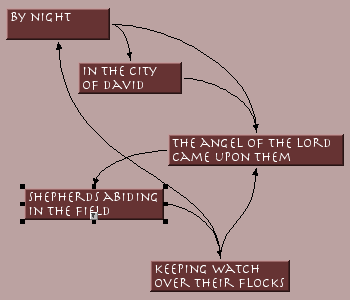Shepherds abiding
People new to hypertext often worry that everything will be confused. "If readers can choose," the worry, "they'll go astray." Hypertext fiction seems an arty postmodern abstraction.
This is wrong.
Let's take a very familiar linear narrative. Today, we'll go with part of the libretto to Messiah, to which Anders Fagerjord was listening the other afternoon:
There were shepherds abiding in the field,
keeping watch over their flocks by night.
And suddenly an angel of the lord came upon them,
And the glory of the lord shown round about them, and they were sore afraid.
But the angel said unto them, 'Fear not, for behold
I bring you good tidings of great joy, that shall be
to all people:
for unto you is born this day in the city of David
a saviour which is Christ the lord.'
And suddenly there was with the angel
a multitide of the heavenly host
praising god, and saying:
Glory to god in the highest. And peace on earth, good will toward men.
(Possible small errors; I'm quoting from the memory of singing the alto part. I left out the "plunk plunk" harpsichord cadences, which I think are as much of the text as the rest, so sue me. Capitalization carefully thought out but idiosyncratic. Note to ancestors: it's just a story, no tsimmes please.)
Now, suppose -- just suppose -- you were going to shoot a movie of this scene. Maybe you're JMS, and you've got to shoot this scene set on Centauri Prime in the days of the old Republic. How do you do it? Do you start with "And suddenly?"

EXT NIGHT: CGI.
The city of David is silhouetted in the distance against the night sky.
ZOOM IN
...to reveal a star moving against the stellar background. It begins to accelerate and descends toward the horizon. The camera follows it, until it it blocked by the shoulder of A SHEPHERD, who is pointing toward a straying lamb.
A SECOND SHEPHERD runs to catch the lamb. As he does so, he notices a growing shadow from the celestial phenomenon, which is now as bright as moonlight.
EXT CGI
Deep space. Stars. In a quotation from the opening short of Star Wars, the HEAVENLY HOST enters the frame with a loud rumble and proceeds onward behind us. In the deep rumble, we can hear '...And peace on earth. Good will toward men.'
....
Why did we shoot it this way? Not just to be perverse, and not just to be different. If the shepherds are going to be scared, the angel has to be a surprise to them. But if the angels surprise the audience, the audience will be simply confused. (If we really do a number, maybe they'll be sore afraid. Oy.) We've got to establish the angels before the shepherds, and we've got to establish the city (and therefore the field) before we get to the angels.
The point here is that this time we don't want to tell the story in chronological order nor in the conventional sequences. At different times and places, we'll want to arrange things differently -- not because we want to tweak the bourgeoisie, but because different arrangements work better for different audiences and situations.
After twenty years, people still think disorientation is a problem with hypertext. This is pure scholastic sloppiness. Disorientation is a problem in cinema, where there's no time to fix things once you've got them disoriented. It's not particularly a problem in hypertext.